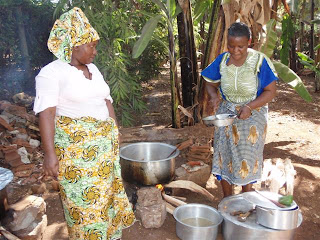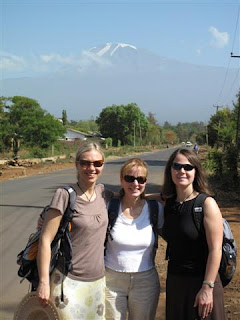







The Story of Agnes
The photos show the cooks making chapatis over a fire. We ate fresh local foods every day. Each day while walking to the clinic we saw women dressed in colorful clothes carrying food on their heads home to their families. Bananas grow everywhere and they are a staple in the Tanzanian diet. The women that cook our amazingly delicious and nutritious lunches each day are HIV positive and have received assistance from the clinic to get back on their feet. They are paid a small stipend to cook for us. They have children and grandchildren to support and they hope to make 10,000 Tanzanian shillings/day, which is approximately $8.00 US/day. I asked to take their photos and agreed I would send them copies. They have very little and appreciate receiving anything in the mail. Their address is: Pamoja Tunaweza Women's Center, Peace Park, Box 8483, Moshi, Tanzania.
Agnes(on the mountain)kindly shared her story with me one day when we went to the local farmers market. Agnes Mtambo is the administrator of the Pamoja Tunaweza Women’s center and her story of HIV is one of pain and triumph, the pain part being a a typical story for an HIV+ woman. Almost ten years ago she had visited her gynecologist because she was having difficulty conceiving her second child. At this visit she had a routine HIV test and the test came back positive. When she went home to tell her husband, she was beaten and her husband left and told his family she was dead. Her own family lived in another town. For a year or so she was able to support herself and her young daughter, but eventually she moved to Moshi, Tanzania for work. She became very ill with AIDS (the disease caused by HIV) and eventually her sister came from South Africa and brought her back to South Africa for medical care. Agnes would have died in Tanzania at that time as there was very little HIV infrastructure and it was difficult to access to HIV medication. The stigma around HIV was very difficult to overcome for Agnes but she constantly fights against it and works to educate other HIV positive women to stand proud and protect their rights as women living ‘positively’. Now, she is in good health on ARV medications (and plans to climb the mountain with us!) and her daughter is HIV-. When she eventually returned to Moshi, her husband's family were shocked to see her alive. She has since been in contact with her own family and has helped her sister, who is also HIV+, to be empowered and live a good life.
Another similar story was told to me by a woman who has 7 children at home. When she came home with an HIV+ test result her husband beat her and kicked her out on the street. She spent 3 months at the Pamoja Tunaweza Center getting on ARV meds and finding work. She now lives with her mother. Her husband has got down on his knees asking her to come back home to help him raise the children, but she is reluctant since like so many women in Tanzania she may find herself facing regular beatings again.
We asked all of the women who come to the clinic what their home life is like and it is such a relief and it also seemed the exception to hear “I live in peace”. Women with violent home lives are the norm and the Women's Center can only help them when they have exhausted all other avenues to create a peaceful marriage or to leave their husbands. One women had been facing beatings for 12 years and her father-in-law had been protecting her from her husband, but her father-in-law had recently died and the beatings were getting worse. She had gone to her own family to no avail so she had come to the center with the hopes that we could help her find work so she could live independently from her husband and raise her two children in peace. She is a good candidate for Ivan's business course.
The Pamoja Tunaweza Women's Center serves many purposes, one of which is to identify strong candidates for a business program. Ivan Esmeral, a volunteer from Montreal who is affiliated with the runs a local business program for women called 'NIWE' which translates to 'Let Me Be Me'. Ivan plans to help some women who have taken the program open a bakery making a Portuguese bread that is popular in Mozambique, but not sold in Moshi. It is a bread made with cornmeal, flour and water that stays fresh for long periods of time. Coincidentally, Sandy’s mother-in-law makes this bread on a regular basis in a trough just the way it has been made in Portugal for generations.
75 people at the clinic the first day is a quiet day by CACHA medical caravan standards. It was quiet because we decided not to advertise on the radio as we had in the spring of 2008 because 1000’s of people had to be turned away and there is no worse job in the clinic than working the gate and telling sick people they have to go home and cannot be seen by a doctor. So, rather than advertise, Karen chose to let the caravan days be spread by word of mouth, however, we can handle up to 400 patients/day. So, a little advertising was done in town and the next few days were busier.
We can see the mountain from the veranda of the B& B where 15 of us working at the clinic are staying. Each morning we wake to the sounds of roosters crowing & dogs happily barking. Life moves at a slow pace here. Most people walk everywhere so the streets are full of people. It makes for a sociable life. I have been joking that there is no words in Swahili for yesterday or tomorrow since people naturally live in the moment. They do not plan ahead and do not spend time anticipating a crisis, but live in the moment and deal with stuff when it happens. Ah, the key to a low stress life, but chaos often results (c'est la vie)!.






